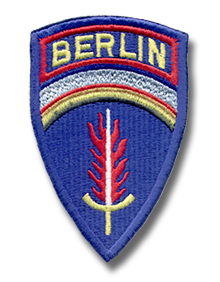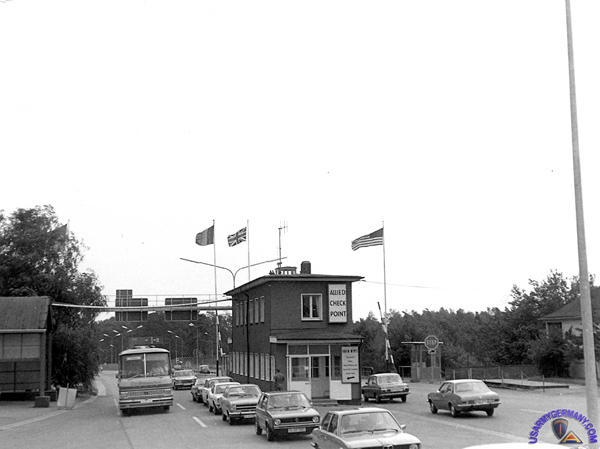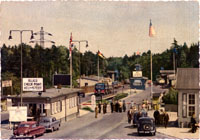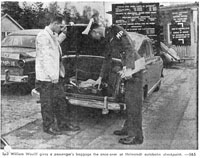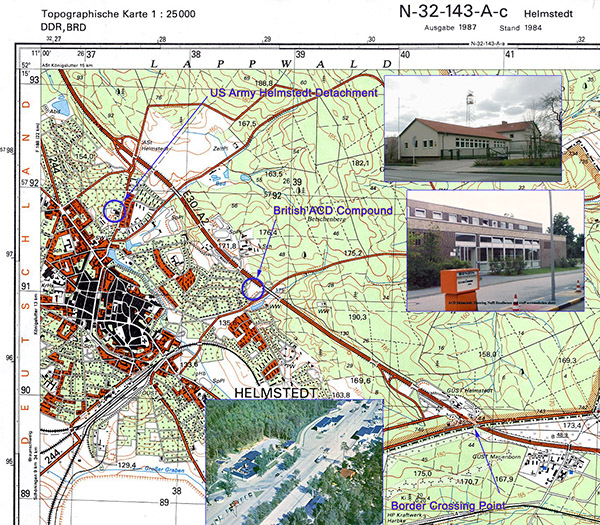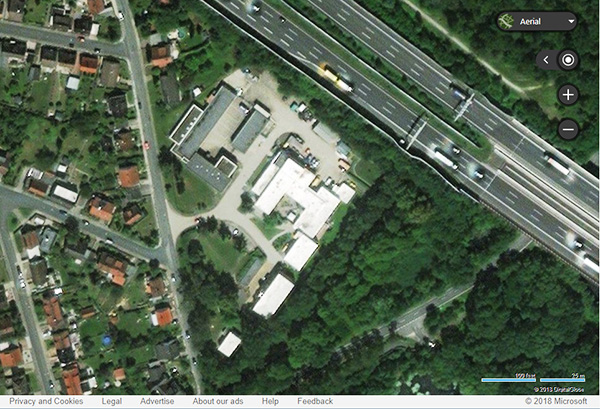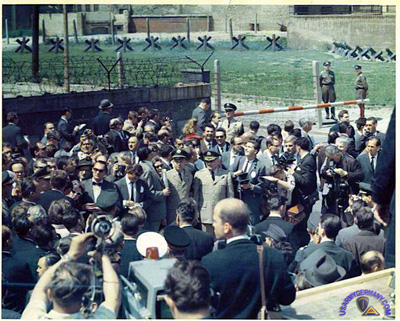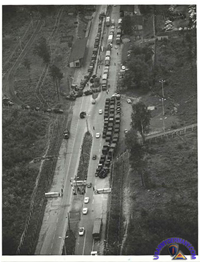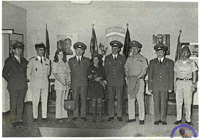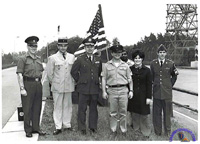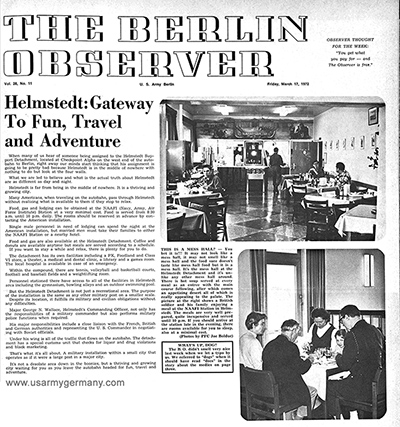| If you do
NOT see the Table of Contents frame to the left of this page, then
Click here to open 'USArmyGermany' frameset |
||||
|
Helmstedt Support Detachment |
||||
|
|
||||
|
||||
|
|
||||
| Helmstedt Support Detachment History | ||||
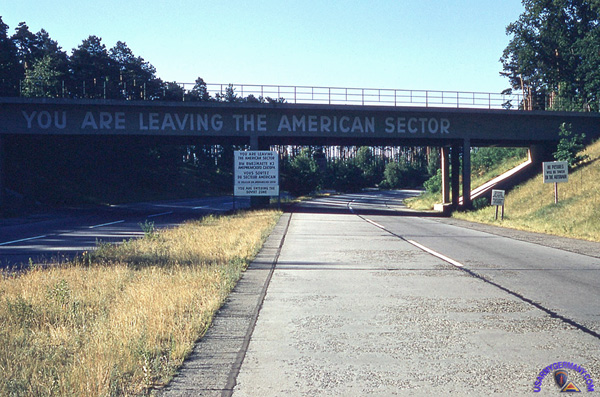 American sector boundary on the Helmstedt-Berlin Autobahn - only authorized road for use of US forces between West Germany and Berlin. |
||||
| 1958 | ||||
(Source: STARS & STRIPES, May 28, 1958) |
||||
Helmstedt Checkpoint Keeps Yanks Hopping By Ernie Weatherall, Staff Writer The last Americans that military travelers talk to before the lonely 110-mile drive along the East German autobahn to Berlin are members of the 7751 Military Police Customs Det in Helmstedt. The four-man customs team is under the supervision of SFC John A Kaboush, who keeps busy shuttling his small staff between the railroad checkpoint to meet passing troop trains and on the autobahn to check cars. It works out all right unless something happens that holds up the trains," he explained. "Then nobody gets any sleep." Under the Bonn Forces Convention, the NATO forces are allowed to maintain their own customs police at the international borders of Germany. They, however, enforce the customs laws of the Federal Republic. "But here at Helmstedt we have our biggest headache," Kaboush pointed out. "Even though West Berlin is a part of the Federal Republic, there are some customs restrictions between the two points." |
||||
|
||||
"There are no base theaters or service clubs, but you don't miss them after awhile," the sergeant explained. They are so used to working on the fringe of the Iron Curtain that they no longer think twice about it. But according to Kaboush, some travelers get very nervous before crossing over into the Soviet Zone. "Often they're so shook up they can hardly write their names in our register book," he said. "Once we even had a guy who really thought there was some kind of iron curtain at the border." |
||||
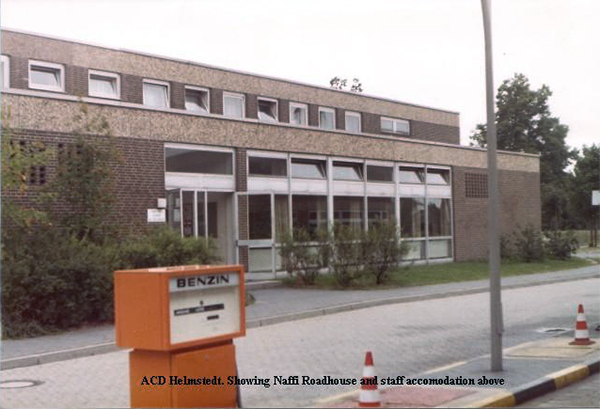 The British NAAFI Roadhouse at Helmstedt (BAOR-Locations.org) |
||||
| 1961 | ||||
| (Source: BAOR Locations, British Army of the Rhine (BAOR) website) | ||||
| Autobahn Control Detachment Helmstedt (British) | ||||
The (British) camp (ACD Helmstedt) was a farmhouse converted into offices downstairs and accomodation upstairs. There was also a spider type hut which housed the kitchen and eating area, and another building which housed a few vehicles and recovery truck with flashing lights!
There was also a single story building which was used as a NAAFI roadhouse. It was completely surrounded by a fence and had a gate house attended by a German civilian. It was located right next to the autobann alongside a petrol station and service area. |
||||
| 1969 | ||||
| (Source: Email from George Wallace, CO Helmstedt Support Detachment, 1969-72); Det Commander, 42nd MP, Bremerhaven, 1972-75) | ||||
| After serving one tour in Berlin, as the Autobahn Operations Officer 1962 - 1966, and upon return from Viet Nam, I was assigned as the Commander, Helmstedt Support Detachment (1969 -1972) and from there as the Detachment Commander of 42nd MP in Bremerhaven, Germany (1972 - 1975). I would be interested to learn more of your Web Site and attend any reunions that you may plan in the future. After retirement from the Army in 1977, I rejoined the San Francisco Police Department, from where I was on an indefinite Military Leave of Abscence. and retired for the second time in 1988 in the rank of Sergeant. I am sorry to say that my retirement pension as SFPD Sergeant is $1200.00 more per month as my Army retirement in the grade of LtCol. It just shows that the Army is not taking good care of the retirees. The Autobahn Operations Officer (Berlin) was involved with the transit of troops, personnel, liaison with the Soviets, and control of Checkpoints Alpha, Bravo and partially of Charlie. There was no customs unit in Berlin, and it only started in 1974 when we opened the first Customs operations unit in West Berlin under my command in Bremerhaven. Rick was placed in charge of the Berlin operations and the 42 MP Customs Group was under command of Col Bob Hooker, who replaced Col Cohen. Hooker was a real doozy person. My first Sergeant was Doodek, who also worked for me as Autobahn operations Sergeant in 1963. Here is a photo of Kennedys visit to Berlin in 1963. It was taken at Checkpoint Charlie with me and my boss in the foreground. For your information there were three MP Customs EM stationed in Helmsted who, as far as I was concerned, were mostly interested in carousing around with the local girls. Once in a while they would send a sniffer dog from Breverhaven, but somehow I believe that the poor canine or the trainer were not proficient to detect any drugs. After my assignment to the MP Customs, my suspicions were coffirmed. |
||||
|
||||
| 1972 | ||||
| (Source: STARS & STRIPES, March 21, 1972) | ||||
At Checkpoint Alpha on the west end of the autobahn to Berlin is the Helmstedt Support Detachment. Food, gas and lodging can be obtained at the NAAFI (Navy, Army, Air Force Institute) Station at a minimal cost. Single male personnel who reserve lodging can spend the night at the American installation, but married men must take their families either to the NAAFI station or a nearby hotel. Food and gas are also available at the Helmstedt Detachment. Coffee and doughnuts are available anytime but meals are served according to a schedule. The detachment has its own facilities including a PX, Foodland and Class VI store, a theater, a medical and dental clinic, a library and a games room. The local hospital is available in case of an emergency. Within the compound, there are tennis, volleyball and basketball courts, football and baseball fields and a weightlifting room. |
||||
|
|
||||
